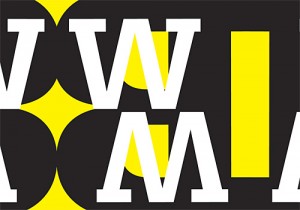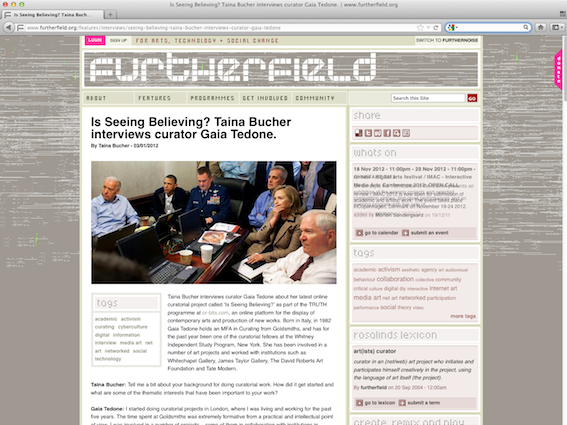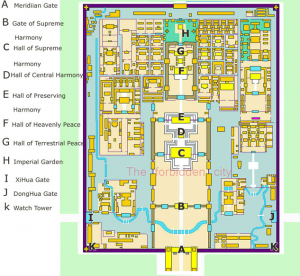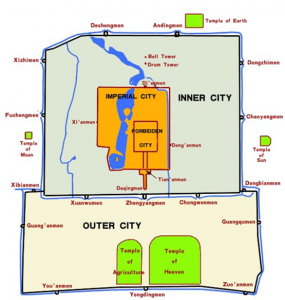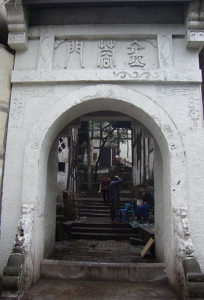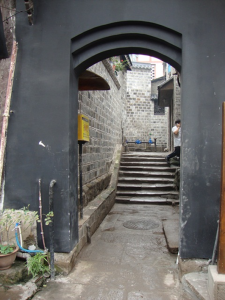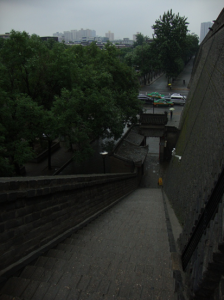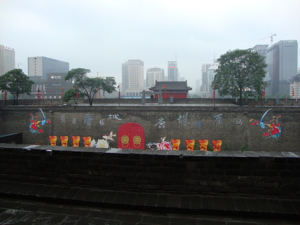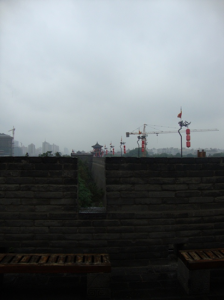The problems with knowledge and information in an online era
We are all familiar with the optimistic ideologies of cyber-libertarianism. This new online space reduces hierarchies, and creates a freer, more equal world – eradicating geographical constraints. The internet provides limitless amounts of information, increasing our ‘knowledge’. Similarly, Neo-Luddites in the opposed corner, clings onto slower, more concrete methods of communication and knowledge sourcing – revering the printed book and face to face discussion.
However, there is no denying the time efficient benefits of immediate access to information regarding any query from a practical to a philosophical level.
Whilst in residence in China, my possibility for this common place dipping in and out of the internet for advice and knowledge was severely limited. Not only social networking sites, but any page that contained text or visuals deemed inappropriate, was shut off by a government sensor. Over time, I stopped trying certain routes or pathways for information, as I was repeatedly being denied access. While I adjusted to the cultural changes in life on a physical level with social behaviour in my studios and within the local streets, I also altered my approach to my behaviour online.
Without looking back too nostalgically, my life whilst in Chongqing felt more ordered, streamlined and focused on the daily tasks at hand, and long term goals. I was not regularly side-lined by twitter and chatter on social networking sites, and I did not spend time
looking through personal photographs of events I had never been and knew little of the people involved. As research based websites for my project were restricted, I focused on conversations, observation and texts that I had brought with me or been given. I did not feel ‘the guilt’, that outside of my own physical life, I was not constantly checking, looking and engaging with what is happening online,
feeling somewhere that perhaps I am missing out on new developments. I just could not access it – so in many ways I was grateful for what the governmental control of the PRC provided for me through censorship.
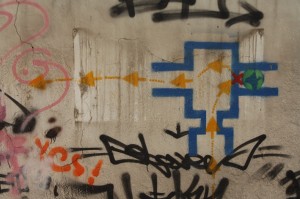
Not all routes lead to home, spraypaint in HuangJePing, 2011
The internet undoubtedly has radicalised opportunities, movement, information, knowledge, time efficiency and communication. But this parallel life online is often tiring, keeping up with constant engagement with ever pouring knowledge and information. Often those I am physically with in a space, I do not focus upon them and vice versa. Perhaps there is a requirement for judgement of the value of information online – which may be identified through alignment with our own personal set of values and interests.
However, in many instances places online link in with our everyday life so closely, it is hard for us to eradicate ourselves from them. For example, friends send invitations to birthday parties within Facebook, meetings are agreed through email, job opportunities exposed through Twitter. When I emailed artist Ellie Harrison in January 2012, I received an automatic response that informed me that as an experiment she would not use her email for the whole month. This is a test which will surely provide interesting results.
Social networking sites provide a large amount of personal honesty and ‘truths’. Confessions of the minutia of daily lives within programmes such as Twitter intrigue us in a similar format as would a reality show, or a Sophie Calle artwork. Although I engage in Twitter, I am concerned and a little perturbed by the public’s willingness to communicate so much about their whereabouts, relationships and duties. For me, there is information that I simply want to keep to myself and those I am close to.
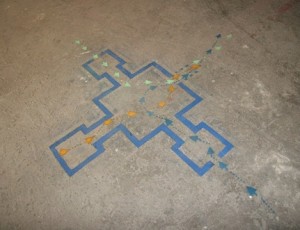
This is where we meet, Spraypaint in 102 Studios, Chongqing, 2011
Slavoj Žižek addresses this concern over ‘privacy disappearing in public’ in his essay, ‘Good Manners in the Age of Wikileaks’. Following a narrative discussing respect for a person’s physical space being invaded, he alludes to –
“Appearance, the public face, is never a simple hypocrisy. E.L. Doctorow once remarked that appearances are all we have, so we should treat them with great care. We are often told that privacy is disappearing, that the most intimate secrets are open to public probing. But the reality is the opposite: what is effectively disappearing is public space, with its attendant dignity.”
I make decisions where I will go and what I will do on a daily basis. I selectively choose what books I will withdraw from the library, knowing that there is a never ending supply of text, image and ‘knowledge’ awaiting me for when I return the next time.
Yet my decision making online is less confident. I am swayed, brought in, tempted through boundaries by speed. I need to become more assertive, and remember when to respectfully say ‘no’. Or do I?
